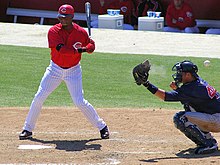
In baseball, a catcher is charged with a passed ball when he fails to hold or control a legally pitched ball that, with ordinary effort, should have been maintained under his control, and, as a result of this loss of control, the batter or a runner on base advances. A runner who advances due to a passed ball is not credited with a stolen base unless he breaks for the base before the pitcher begins his delivery.
History
A passed ball may be scored when a base runner reaches the next base on a bobble or missed catch by the catcher, or when the batter–runner reaches first base on an uncaught strike three (see also Strikeout).
A closely related statistic is the wild pitch. As with many baseball statistics, whether a pitch that gets away from a catcher is a passed ball or wild pitch is at the discretion of the official scorer. Typically, pitches that are deemed to be ordinarily catchable by the catcher, but are not, are ruled passed balls; pitches that get by the catcher that are thought to have required extraordinary effort by the catcher in order to stop them are wild pitches. If the pitch was so low as to touch the ground, or so high that the catcher has to rise out of his crouched position to get to it, or so wide that the catcher has to lunge for it, it is usually then considered a wild pitch and not a passed ball.
A run scored due to a passed ball is not recorded as an earned run. However, a run scored due to a wild pitch is recorded as an earned run.
Passed balls and wild pitches are considered to be part of the act of pitching rather than fielding. Thus they are kept as separate statistics and are not recorded as errors.
There tends to be a higher incidence of passed balls when a knuckleballer is pitching. The physics that make a knuckleball so difficult to hit make it similarly difficult to catch. While teams with a knuckleballer on their pitching staff often employ a special "knuckleball catcher" who is equipped with a knuckleball mitt, similar to a first baseman's glove, it is still extremely difficult to catch.
Records
Further information: List of Major League Baseball career passed balls leadersThe MLB career record for passed balls allowed is 763 by Pop Snyder, while Rudy Kemmler set the single season record of 114 in 1883. The single season record in the modern era is 35, set by Geno Petralli in 1987. The record for passed balls in a single game, six, was set by Rube Vickers in 1902 and later tied by Petralli in 1987 and Jerry Goff in 1996. The record for passed balls in a single inning is four, and is jointly held by Petralli, Ray Katt, and Ryan Lavarnway, all three of whom were catching knuckleball pitchers (Charlie Hough, Hoyt Wilhelm, and Steven Wright, respectively).
See also
- Bye (cricket) – cricket term for an unhit, uncaught ball
References
- "Definition of PASSED BALL". www.merriam-webster.com. Retrieved 2021-06-23.
- ^ "Passed Ball (PB)". MLB.com. Archived from the original on 23 June 2021. Retrieved 29 June 2021.
- "Definition of WILD PITCH". www.merriam-webster.com. Retrieved 2021-06-23.
- "35 Inch All-Star Professional CM3000KM Adult Baseball Knuckle Ball Catcher's Mitt". HeadQuarters 4 Sports Inc. Retrieved 2024-10-30.
- "Knuckleball (KN) | Glossary". MLB.com. Retrieved 2024-10-30.
- "Progressive Leaders & Records for Passed Balls". Baseball-Reference.com. Retrieved June 22, 2017.
- ^ Jackson, Frank (7 December 2018). "The Ghost of Passed Balls Past". The Hardball Times. Retrieved 8 March 2021.
- ^ Gotsulias, Stacy (August 30, 2017). "Aug. 30, 1987: When Geno Petralli had one of the worst games ever". www.sportingnews.com. Retrieved 8 March 2021.
- ^ "TEXAS' PETRALLI SETS THE RECORD FOR PASSED BALLS". The Morning Call. December 27, 1987. Retrieved 8 March 2021.
- Albee, Dave (May 19, 1996). "Passed-Ball Infamy Not End Of World For Astros' Goff". Seattle Times. Marin Independent Journal. Retrieved 8 March 2021.
- Clair, Michael (April 28, 2016). "Watch No. 1 NFL draft pick Jared Goff's dad, Jerry, hit his first MLB single". MLB.com. Retrieved 8 March 2021.
- Duffey, Gene (August 7, 2013). "Lavarnway finds redemption following wild first". MLB.com. Retrieved 8 March 2021.
External links
- Baseball Rules See section 10.13
- Passed Balls at the Encyclopedia of Baseball Catchers